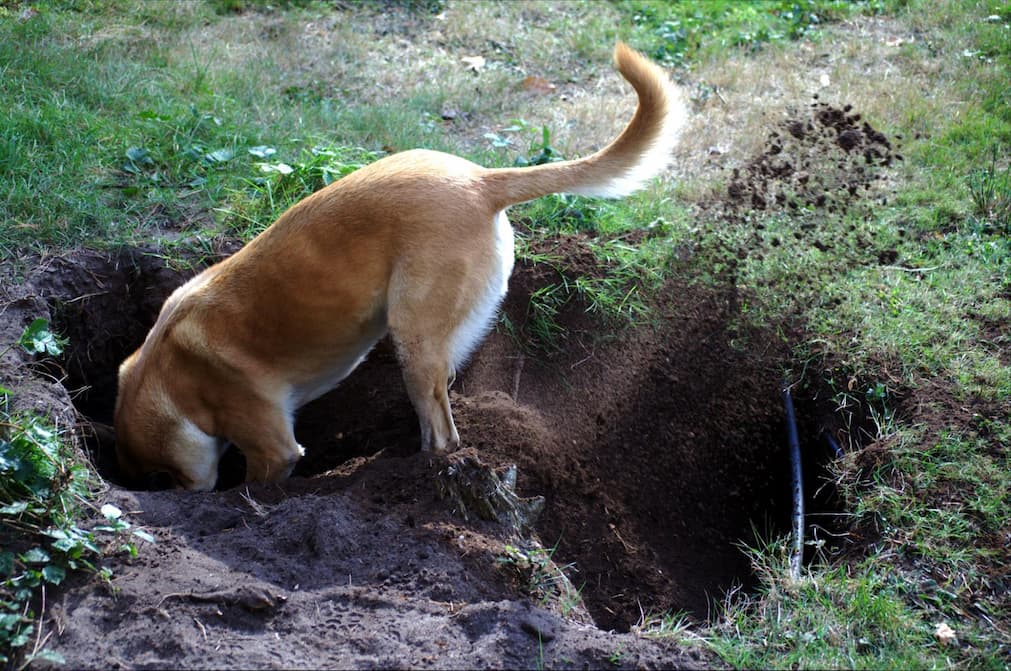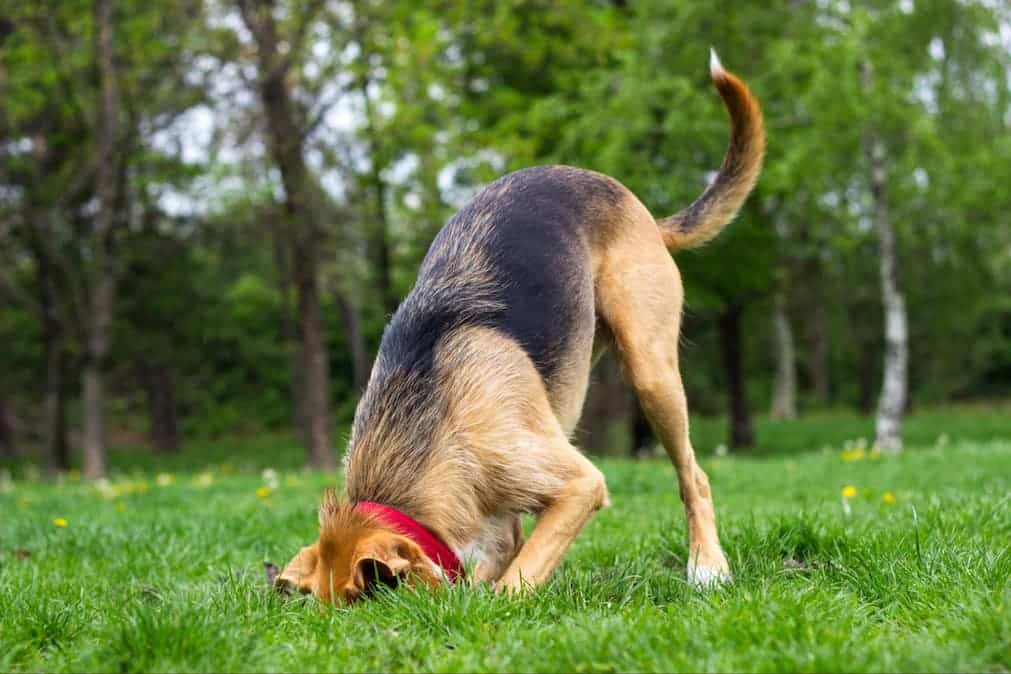Hi Cesar,
My boyfriend and I have three dogs. Two are Rottweilers (three years old and one-year-old), and one is a Labrador retriever (nine months old). Our dogs love to dig, and now our backyard is in shambles. We tried burying their poop in the holes so they would not dig anymore, but that didn’t stop them.
We are moving to a new house and want to break them of that habit. Is there something else we can do to stop the digging?
Please help!
Sincerely,
Cindy Kozma
Cesar Millan’s Answer:
Hi Cindy,
We know that digging can be harmful to people’s environments, but, at the same time, digging for some dogs is an activity that keeps them balanced. Digging is a form of exercise and distraction; for a dog, it can be simply a matter of being bored and having nothing else to do. It’s especially common if it’s in their breed to be diggers; when it’s part of their nature, they’ll often drain some of that extra energy by doing something they are instinctually familiar with.
Human parents will bring their children to the playground and let them play in the sandbox because digging is part of our nature as well. Today, we don’t use that ability often, but we still crave it deep in our genes. So we have a specific place we allow kids to dig. That can be one option for you – to make a place in your yard where your dogs can dig. If that is still unacceptable to you, you need to find a way to drain the energy they release by digging.
Exercise is always the best way to drain any dog’s pent-up energy. Running with your dog, swimming with your dog, hiking with your dog – there are many options.
So my question to you would be: do you know the energy levels of your dogs, and are you challenging them enough physically so that they don’t feel the need to dig, bark, jump, or chew?
Are they exercising, and for how long? If it isn’t long enough, I recommend intensifying that exercise. If you don’t have enough time, I recommend putting backpacks on them, which can help turn 30 minutes of exercise into an hour.
Stay calm and assertive,
Cesar Millan
Why Do Dogs Dig?
Dogs are known to be diggers, and understanding why they dig is essential for their well-being and peace of mind. Dogs may dig for various reasons, such as boredom, anxiety, instinct, or even to hide their possessions. They may also dig to regulate their body temperature or escape an enclosure. Understanding why your dog is digging will help you address the root cause and find a solution that satisfies you and your furry friend. With proper training, exercise, and mental stimulation, you can redirect your dog’s digging behavior and prevent damage to your yard or property.
It is believed that the digging behavior is rooted in their ancestral traits. In the wild, dogs dig dens to protect themselves from predators and keep warm during the colder months. Digging was a behavior used to chase their prey. Even though dogs today are domesticated, this instinct to dig remains strong.
Trying to Escape
Another reason dogs might dig is so that they can roam, or find a mate. Male dogs may dig to try to find a female in heat. Your furry friend could also be seeking freedom from the confinement of your backyard. Spaying or neutering your pet is the best way to ensure they have less of a desire to roam far from home.
Hunting
Dogs will dig in the ground to get to the animal that lives there. Rodents and moles could dwell in your yard, and furry friends may only stop digging once they find one.
Here are some signs that your pet is digging to find prey:
- The digging is in one spot, not all over the yard.
- The digging is in a concentrated path.
- They stick their nose in the ground.
- They get excited when they try to retrieve something from their dug hole.
If your dog is seeking a rodent in your backyard, you can find safe solutions to remove them using repellants and humane traps. Please refrain from using poisonous products to deter rodents, as they can harm your dog.
Protection and Comfort
Some dogs aren’t looking for an escape. They could be anxious about being alone. If it’s a hot summer day, sometimes dogs dig holes to get to the cooler soil. The holes can also act like a shield on a cold, wet, or windy day. You can tell your dog is looking for protection if they do one of these:
- Lies in the holes.
- The dog does not have adequate protection from the elements.
- The dog shelter is too hot or cold.
- The holes are near trees, water sources, or buildings.
Entertainment
Dogs are known for their playful and curious nature, and digging is one of the many activities they enjoy. Digging provides them entertainment and mental stimulation, especially when they are left alone for extended periods. Here are some ways you can tell your pup is digging as a form of entertainment.
- Digging to release excess energy.
- Not enough toys to entertain themselves.
- They are left alone for too long and are bored.
- Wanting to play.

How to Train Your Dog to Stop Digging
Digging is a natural behavior for dogs. However, breaking the habit can be frustrating and lengthy for pet owners, let alone the destruction the behavior causes. Training your pup to stop digging requires patience, positive reinforcement, and consistency.
Positive Reinforcement
Using positive reinforcement is a powerful training resource in your toolbox. Rather than disciplining the negative behavior of digging, you will offer rewards and praise when your pup does the behavior you desire. For example, if your dog goes into the backyard to do his business and play a little without digging, offer plenty of praise and a treat for not digging.
Redirect the Behavior
Rather than punishing your pet when he or she digs in the backyard, give your dog a place to dig freely. Sandboxes are a great option; you can hide toys and rubber bones in the sand. Finding the treasures will give instant gratification, and your pet will find that location more rewarding than other spots in the yard. A designated digging spot allows you to redirect your dog should it start digging in other areas of the yard.
Offer Exercise
One way to get rid of extra energy is to exercise your dog. Go for at least one walk a day. If you notice your furry friend still has much energy, add another walk.
Plenty of Playtime
Dogs love to play, and playing with your pup also allows you to bond with them. Use frisbees, balls, or other toys to make playtime more engaging.
Professional Training
If you’ve exhausted your options and have tried multiple ways to get your dog to stop digging, consider getting a professional dog trainer to help you. It may take a few sessions to stop this bad habit.
Practical Tips for Preventing Fence Digging
If you run into issues with the above advice, here are a few things you can do to try and stop your pet from digging up your backyard.
- Put large rocks that are partially buried under the fence line.
- Bury the bottom of your fence one or two feet beneath the soil.
- Reward your dog for good behavior to minimize escape attempts.
- Bury chicken wire at the bottom line of your fence. Roll the sharp edges to face away from your yard as you do this.
If you allow your dog to dig holes throughout your yard and garden, you will have a hard time keeping the landscaping look nice. Digging is something you can train your dog to do in an approved area of the yard to prevent damage to your property.
What are some of the most surprising finds your dog has dug out of the yard?











